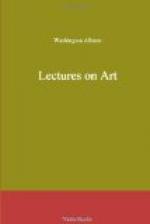And here it may be well to notice an apparent objection, that will probably occur to many, especially among painters. How, then, they may ask, if the principle in question be universal and imperative, do we account for the mistakes which even great Artists have sometimes made as to the realizing of their conceptions? We hope to show, that, so far from opposing, the very fact on which the objection is grounded will be found, on the contrary, to confirm our doctrine. Were such mistakes uniformly permanent, they might, perhaps, have a rational weight; but that this is not the case is clearly evident from the additional fact of the change in the Artist’s judgment, which almost invariably follows any considerable interval of time. Nay, should a case occur where a similar mistake is never rectified,—which is hardly probable,—we might well consider it as one of those exceptions that prove the rule,—of which we have abundant examples in other relations, where a true principle is so feebly developed as to be virtually excluded from the sphere of consciousness, or, at least, where its imperfect activity is for all practical purposes a mere nullity. But, without supposing any mental weakness, the case may be resolved by the no less formidable obstacle of a too inveterate memory: and there have been such,—where a thought or an image once impressed is never erased. In Art it is certainly an advantage to be able sometimes to forget. Nor is this a new notion; for Horace, it seems, must have had the same, or he would hardly have recommended so long a time as nine years for the revision of a poem. That Titian also was not unaware of the advantage of forgetting is recorded by Boschini, who relates, that, during the progress of a work, he was in the habit of occasionally turning it to the wall, until it had somewhat faded from his memory, so that, on resuming his labor, he might see with fresh eyes; when (to use his expression) he would criticize the picture with as much severity as his worst enemy. If, instead of the picture on the canvas, Boschini had referred to that in his mind, as what Titian sought to forget, he would have been, as we think, more correct. This practice is not uncommon with Artists, though few, perhaps, are aware of its real object.
It has doubtless the appearance of a singular anomaly in the judgment, that it should not always be as correct in relation to our own works as to those of another. Yet nothing is more common than perfect truth in the one case, and complete delusion in the other. Our surprise, however, would be sensibly diminished, if we considered that the reasoning or reflective faculties have nothing to do with either case. It is the Principle of which we have been speaking, the life, or truth within, answering to the life, or rather its sign, before us, that here sits in judgment. Still the question remains unanswered; and again we are asked, Why is it that our own works do not always respond with equal veracity? Simply because we




